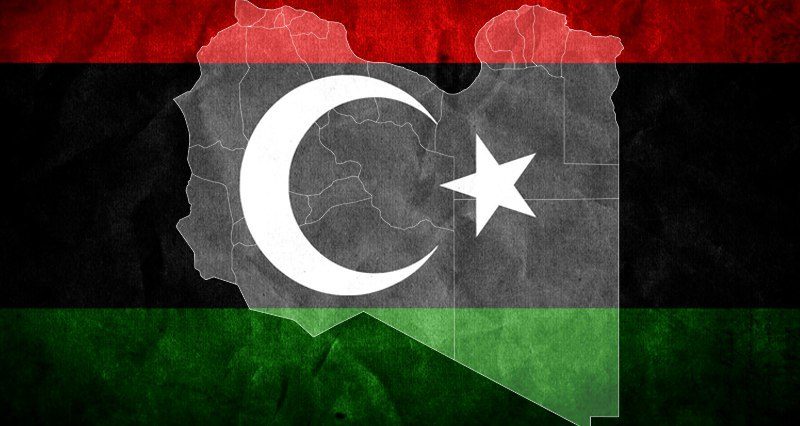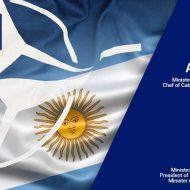Russia and Turkey are becoming key powers on which peace in Libya depends. However, a number of internal and external factors may complicate their efforts.
On January 13 in Moscow, representatives of Russia, Turkey and the parties to the Libyan conflict held talks. The event was organized at the highest levels: Turkish Foreign Minister Mevlut Cavusoglu and Defense Minister Hulusi Akar both came to the Russian capital to participate in the dialogue.
The opposing sides of the conflict in Libya were represented by their most senior officials: the head of the Government of National Accord (GNA) Fayez al-Sarraj and the Chairman of the State Council Khalid al-Mishri on one side, and the commander of Libyan National Army Khalifa Haftar and chairman of the House of Representatives Aguila Saleh on the other.
On Monday, following many hours of negotiations, Russian Foreign Minister Sergei Lavrov said that al-Sarraj and al-Mishri had signed an agreement, while Haftar took a break until the next morning. However, when the next morning arrived, he left the Russian capital without signing the document.
Turkish Foreign Minister Mevlut Cavusoglu criticized Haftar’s decision, declaring that “Haftar not signing the Libya truce deal shows who wants war and who wants peace.” The Minister noted that the GNA had signed the document, and that Turkey, for its part, has fulfilled all its obligations to facilitate the peace process. Similar statements were made by Turkish President Recep Tayyip Erdogan.
.#video | ‘We won't shrink from giving #Haftar the lesson he deserves’ :Turkish President @RTErdogan
*Despite this positive attitude of the #Libya's #Tripoli government led by #Sarraj, the putschist Haftar refused to sign the #ceasefire agreement. pic.twitter.com/8wt4Hbd6Io
— ANADOLU AGENCY (ENG) (@anadoluagency) January 14, 2020
On January 14, the head of the Turkish state said that he is ready “to teach a lesson” to Haftar.
Diplomatic success
On January 8, the Presidents of Turkey and Russia, Recep Tayyip Erdogan and Vladimir Putin, called on the parties in Libya to cease fire and immediately sit down at the negotiating table. Both sides of the conflict in Libya accepted this proposal. On January 12, the ceasefire went into effect.
The talks in Moscow were a continuation of the process that Putin and Erdogan had launched the week before. Despite the absence of a formal document with the signatures of the warring parties would be, the results of the negotiations should be considered successful.
The very fact that the meeting took place can be considered a significant achievement, given that al-Sarraj and Haftar had refused to communicate with each other since March 2019. ( https://alshahidwitness.com/haftar-sarraj-agreement-libya/ )
Of course, they had already met in Abu Dhabi, Palermo and Paris… however, the previous meetings took place in a slightly different setting, when the conflict between the parties was not quite so intense. It is significant that last week, Italian Prime Minister Giuseppe Conte was unable to get Haftar and al-Sarraj together in Rome.
In the current environment, only Turkey and Russia were able to negotiate between the parties. It is also worth noting that neither the GNA nor the government in Tobruk, nor Haftar himself, finally refused either a truce or the continuation of negotiations. Neither Russia, nor Turkey, nor the parties to the conflict in Libya have refused to participate in the conference in Berlin, which is due to take place on January 19.
EU countries were forced to admit that joint Turkish-Russian efforts were an important step towards a conference in Berlin.
This demonstrates that the efforts made by the Europeans to reconcile Cyrenaica and Tripolitania essentially failed. Other actors volens nolens should take into account the interests and the steps made by Ankara and Moscow in that direction.
Intra-Libyan contradictions
In order to understand the prospects of the peace process in Libya, it is worth considering the reasons why it was not possible to sign the final document at the talks in Moscow. They can be divided into two categories: internal and external.
At first glance, both parts of the conflict in Libya put forward impossible requirements for each other. On the one hand, the GNA demands that Khalifa Haftar retreat to the positions his army held before the offensive in April 2019. On the other, Haftar insists that his troops enter Tripoli.
A military source at the Libyan army’s High Command told Al-Arabiya that Haftar advocated the dissolution of armed militias and the transfer of their weapons before signing an agreement to continue the armistice between his forces and Tripoli forces.
At the same time, it is worth recognizing that after the capture of Sirte, it became obvious that the military advantage was on Haftar’s side. Ultimately, it is he who is able to Tripoli, and the forces loyal to the GNA are far away from Benghazi or Tobruk. Tripoli can count on Turkey’s military assistance, but a massive military invasion will be needed to turn the tide in favor of the GNA.
Ankara cannot afford this, since a significant part of Turkish society disapproves of the entry of troops into Libya.
In addition, such an invasion would entail Egypt’s open intervention in Libya. On January 12, Aguila Saleh told the Parliament of Egypt that the government in Tobruk may request the intervention of Egyptian Armed Forces in such a case. A war between Egypt and Turkey would have extremely unpredictable consequences is an outcome that nobody wants.
Moreover, active intervention by Turkey, as the power that once ruled Libya, could also result in unwanted consequences, such as the unification of Libyan tribes under the flag of the LNA in order to resist “Turkish colonialism.”
Given the situation, it was not constructive for representatives of the GNA at the negotiations in Moscow to declare the need for Haftar’s troops to withdraw, nor was it a good idea to speak negatively about the direct negotiations between the parties to the conflict.
On the other hand, paradoxically, strong demands by negotiators during diplomacy can actually mean that sides are preparing for a compromise. Parties often intentionally increase their demands so that they can later sacrifice some of them.
On January 14, the Russian Ministry of Defense stated that “the LNA commander Marshal Khalifa Haftar positively accepted the final statement, but before signing it took two days to discuss the document with leaders of the LNA-supporting tribes.”
External factors
After taking off from Moscow, Haftar’s plane landed in Amman. It is to be expected that he will discuss or has already discussed the terms of the agreement with the GNA with his foreign policy partners not only with the leadership of Jordan, but also the UAE, Saudi Arabia and France.
General Commander of the Libyan National Army and the speaker of the House of Representatives in Jordan to need king Abdullah II #Jordan #Libya #Hafter #LNA #HoR pic.twitter.com/KfnmpaDmvb
— M.LNA (@LNA2019M) January 14, 2020
Of all European countries, France most actively participated in the overthrow of Gaddafi, hoping to turn Libya into a dependent territory. Thus the rising influence of both Russia and Turkey does not suit Paris.
Bringing Russia and Turkey to the forefront in resolving the Libyan conflict is also not in the US’ interests. On January 11, senior US officials met separately with Libyan interior minister Fathi Bashagha and general Khalifa Haftar in Rome on January 9 , declaring Turkish and Russian presence in Libya to be “toxic foreign interference.”
U.S. officials voiced their serious concerns to Libyan parties about toxic foreign interference. All parties should heed calls for de-escalation and forge a durable political solution in #Libya. Full statement: https://t.co/Np5BkLS0XL
— U.S. Embassy – Libya (@USAEmbassyLibya) January 11, 2020
Turkish-Russian cooperation is the key to building a multipolar system in the Eastern Mediterranean and the Middle East. A successful peace process in Libya will enhance the status of both powers. Therefore, it is in the interests of the United States to oppose it.
Because of this, we should expect the Americans to put pressure on all sides of the conflict through networks of influence in order to disrupt the Russian-Turkish initiative.
CIA networks among the Muslim Brotherhood will be used to try to influence Tripoli. The meeting between al-Sarraj and US Ambassador to Turkey David M. Satterfield, which took place on January 14, presents the same possibility.
The United States can also indirectly try to influence Haftar through its key partner in the region: Saudi Arabia.
At the same time, it is worth noting that Russia and Turkey are attempting to maximize the interests of other regional players. Earlier, President Erdogan discussed this issue during his visit to Tunisia. On January 13, he met with Giuseppe Conte, who later went to Egypt. Known for supporting Erdogan, the Turkish newspaper Yeni Safak published an article urging Egypt to begin cooperation with Turkey on Libya.
President Putin has recently been discussing the Libyan issue with the leadership of France, Germany, Qatar, the UAE and Egypt. This shows that both Moscow and Ankara are interested in making their initiative truly multipolar and multilateral.









Leave a Reply